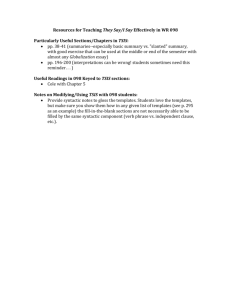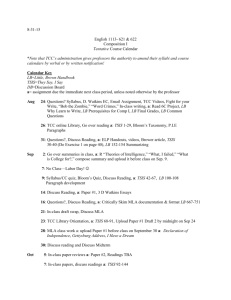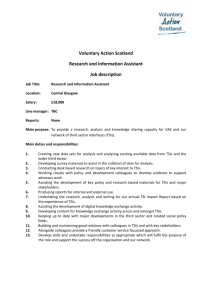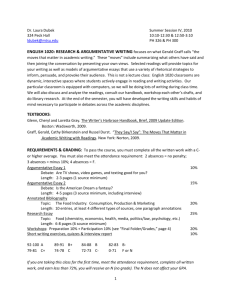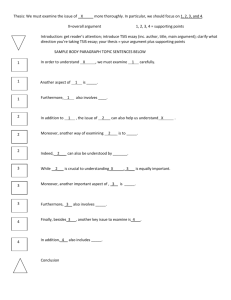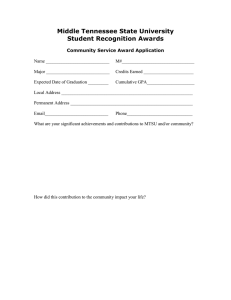1020003 ENGLISH 1020-078 Research and Argumentative Writing
advertisement
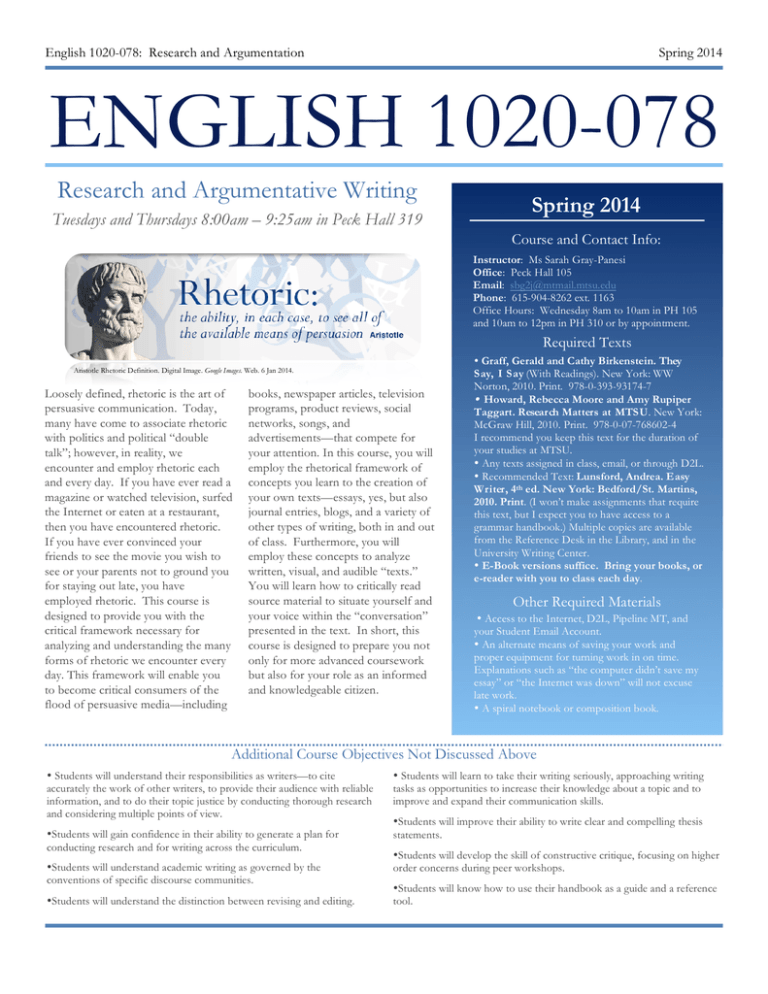
1 2 English 1020-078: Research and Argumentation Spring 2014 ENGLISH 1020-078 1020003 Research and Argumentative Writing Tuesdays and Thursdays 8:00am – 9:25am in Peck Hall 319 Spring 2014 Course and Contact Info: Instructor: Ms Sarah Gray-Panesi Office: Peck Hall 105 Email: sbg2j@mtmail.mtsu.edu Phone: 615-904-8262 ext. 1163 Office Hours: Wednesday 8am to 10am in PH 105 and 10am to 12pm in PH 310 or by appointment. Required Texts Graff, Gerald and Cathy Birkenstein. They Aristotle Rhetoric Definition. Digital Image. Google Images. Web. 6 Jan 2014. Loosely defined, rhetoric is the art of persuasive communication. Today, many have come to associate rhetoric with politics and political “double talk”; however, in reality, we encounter and employ rhetoric each and every day. If you have ever read a magazine or watched television, surfed the Internet or eaten at a restaurant, then you have encountered rhetoric. If you have ever convinced your friends to see the movie you wish to see or your parents not to ground you for staying out late, you have employed rhetoric. This course is designed to provide you with the critical framework necessary for analyzing and understanding the many forms of rhetoric we encounter every day. This framework will enable you to become critical consumers of the flood of persuasive media—including books, newspaper articles, television programs, product reviews, social networks, songs, and advertisements—that compete for your attention. In this course, you will employ the rhetorical framework of concepts you learn to the creation of your own texts—essays, yes, but also journal entries, blogs, and a variety of other types of writing, both in and out of class. Furthermore, you will employ these concepts to analyze written, visual, and audible “texts.” You will learn how to critically read source material to situate yourself and your voice within the “conversation” presented in the text. In short, this course is designed to prepare you not only for more advanced coursework but also for your role as an informed and knowledgeable citizen. Say, I Say (With Readings). New York: WW Norton, 2010. Print. 978-0-393-93174-7 Howard, Rebecca Moore and Amy Rupiper Taggart. Research Matters at MTSU. New York: McGraw Hill, 2010. Print. 978-0-07-768602-4 I recommend you keep this text for the duration of your studies at MTSU. Any texts assigned in class, email, or through D2L. Recommended Text: Lunsford, Andrea. Easy Writer, 4th ed. New York: Bedford/St. Martins, 2010. Print. (I won’t make assignments that require this text, but I expect you to have access to a grammar handbook.) Multiple copies are available from the Reference Desk in the Library, and in the University Writing Center. E-Book versions suffice. Bring your books, or e-reader with you to class each day. Other Required Materials Access to the Internet, D2L, Pipeline MT, and your Student Email Account. An alternate means of saving your work and proper equipment for turning work in on time. Explanations such as “the computer didn’t save my essay” or “the Internet was down” will not excuse late work. A spiral notebook or composition book. Additional Course Objectives Not Discussed Above Students will understand their responsibilities as writers—to cite accurately the work of other writers, to provide their audience with reliable information, and to do their topic justice by conducting thorough research and considering multiple points of view. Students will gain confidence in their ability to generate a plan for conducting research and for writing across the curriculum. Students will understand academic writing as governed by the conventions of specific discourse communities. Students will understand the distinction between revising and editing. Students will learn to take their writing seriously, approaching writing tasks as opportunities to increase their knowledge about a topic and to improve and expand their communication skills. Students will improve their ability to write clear and compelling thesis statements. Students will develop the skill of constructive critique, focusing on higher order concerns during peer workshops. Students will know how to use their handbook as a guide and a reference tool. 1 2 English 1020-078: Research and Argumentation Spring 2014 Evaluation and Grade Distribution Course Grade Distribution: To pass this course and earn three credits, you must earn an overall average of C- or above. I will not use the grade “D” in grading assignments, since anyone receiving an overall grade of “D” or below for the course will not pass the class. The only exception is for first time 1020 students: you may receive an “N” (non-failing or not graded) instead of an “F” for the final grade IF you have met all of the course requirements (including attendance) and completed all assignments. The “N” grade does not affect your GPA; however, if received, you will have to retake English 1020. A: 100-90 / B+: 89-88 / B: 87-82 / B-: 81-80 / C+: 79-78 / C: 77-72 / C-: 71-70 / 69 and below: F A Note on Grades: Your final grade will be determined by dividing the total number of points you’ve received by 1000. Thus, if you accumulate 863 points, your final grade will be 86%, and you will receive a B. Corporate Baby. Digital Image. Google Images. Web. 6 Jan 2014. Grade Breakdown: Final Exam Blog Posts/Journal Entries Annotations Peer Collaboration Workshops Summary/Response Paper Response/Argument Casebook/Presentation Researched Argumentative Essay 50 100 100 100 125 150 175 200 “Rhetoric is power: the power to see the means of persuasion available in any situation” ~Carol Lea Clark Praxis: A Brief Rhetoric 2nd ed. Southlake, TX: Fountainhead, 2012. Print. Assignments Blog Posts/Journal Entries: We will begin each class period with a writing exercise to be completed either in your journal or via your blog, which we will set up on either the first or second day of class. When evaluating these exercises, my main question will be “to what extent does this post reveal engaged thinking about the topic?” You will not be able to make up any entries missed if you are late or absent. Annotations: Since critical reading forms the foundation of good communication, we will practice annotating texts in this class, both individually and in groups. At least four times throughout the semester, I will collect your annotations for grading. Like your blog posts and journal entries, I will be grading on the extent to which your annotations reveal engaged thinking about the topic, rather than whether you annotated “correctly.” Arctic Not For Sale. Digital Image. Google Images. Web. 6 Jan 2014. “Whether it’s trying to convince others that something is more true, more virtuous, or more desirable—all communication is rhetoric in action.” ~Leonard Koren Arranging Things: A Rhetoric of Object Placement. Berkley: Stone Bridge, 2003. Print. 2 Peer Collaboration Workshops: We will have peer collaboration workshops a few days before you turn in final drafts of each major project. If you come to class without a complete draft of your essay on workshop days or without a willingness to offer beneficial, constructive criticism to your peers, you will not receive points for that workshop. By participating in this course’s community, you agree to share your writing with the class in the form of reading free writes, peer collaborations, writers workshops, and presentations. English 1020-078: Research and Argumentation Spring 2014 Digital Rhetoric. Graphic. Google Images. Web. 6 Jan 2014. Assignments, Continued Class Policies Summary/Response Essay: Our first paper will allow you to stretch your rhetorical legs through identification and analysis of another writer’s argument and blending that analysis with your own ideas to form your own unique argument. This essay is not concerned with locating and evaluating sources other than the primary text to which you’re responding. Project Guidelines: With each of the four writing projects, I will distribute an assignment sheet that details my expectations and the project’s parameters. The assignment sheet will also specify the word count requirements and due dates for drafts and final versions. You will have rough drafts of your projects read and commented on by me, as well as evaluated by your peers in peer collaboration sessions BEFORE you turn in a final revised draft for a grade. My comments will discuss global strengths and opportunities of your paper—such as content and organization. The final draft of any project should evidence significant revision from the first draft. Response/Argument: For this essay, you will again summarize and respond to a writer’s argument; however, you will be taking the opposite stance. If you agreed with the writer in the first assignment, you will disagree here. This assignment emphasizes the importance of considering arguments and ideas from all angles even if you believe you’ve established your own point of view. In addition, you will be researching and incorporating secondary sources in this project. Casebook/Presentation: An extended version of an annotated bibliography, the third assignment will allow you to collect the information you will use in your final project. Like an annotated bibliography, you will collect at least three to five different sources and provide a summary and evaluation of the sources. However, unlike most annotated bibliographies, your casebook will also have an introduction, conclusion, and headnotes for each source. Furthermore, you will present your Casebook to the class in the form of a short oral research proposal. Researched Argumentative Essay: For your fourth project, you will leverage all of the rhetorical strategies you’ve learned this semester. Using the research from your Casebook, you will make an argument about some aspect of the Food Industry, Popular Culture, or The American Dream. You can write from any disciplinary perspective—psychology, economics, business, science, advertising, health and nutrition, media, art and culture, etc.. In any case, you must use at least two sources from your Casebook to support your argument for or against whatever issue you choose to examine. Final Exam: Your final “exam” will consist of a multimodal presentation of your findings from your Researched Argumentative Essay. Report presentations are very common in the workaday world, and this final assignment will give you the opportunity to practice the skills needed to be present your findings effectively. All final projects and rough drafts will be turned in electronically via the D2L Dropbox. Each project will be submitted to Turnitin.com to generate an “origination report,” (please see the University’s policy on academic integrity on the following pages for more information). Complete guidelines on what must be included with each project will be provided on each of your assignment sheets. I will not discuss your essay grades within the first 24 hours after you get them back. This is to allow you time to read all of my comments and reflect on them in order to craft informed questions that my comments do not already answer. Late Work Policy: All assignments must be turned in on time. Please submit all assignments to the appropriate Dropbox in D2L by 11:59pm the day they are due. I will deduct one letter grade for each day (day, not class period) the paper is late. I will not accept major projects that are more than three days late. “My computer crashed” or other such excuses are not viable. A threefold approach is recommended for ensuring you do not lose your work: save work to a flash drive, email it to yourself, and save it to the University’s S-Drive or other online dropbox system such as Dropbox or Google Drive. When working in University computer labs, DO NOT save to the desktop and DO NOT wait until you are finished to save your document. Save your work to a flash drive or other portable device periodically (every 5 minutes or so) and then email it to yourself and/or save it to an online server to ensure you do not lose your work. In-class writings, Continued . . . 3 3 English 1020-078: Research and Argumentation Spring 2014 (Continued) blog posts, outside research, and informal writing will not be accepted late and cannot be made up. Failure to complete all components of the four major projects will result in a failing grade for the course. Extensions: There is one exception to the late work policy: you can turn ONE project in up to one class period late with no penalty. If you fail to turn this project in by 11:59pm the night before the next class period, I will deduct one letter grade for each additional day (day, not class period) it is late. You may not request an extension for the Researched Argumentative Essay. Attendance Policy: Attendance in this course is crucial; therefore, you are expected to be in class, on time, every day. I will take attendance each day at the beginning of class. Please be on time—more than 15 minutes late, and you’re counted tardy. More than 30 minutes late, and you’re counted as absent. Three instances of tardiness or leaving class early will equal one absence. If you arrive late, it is your responsibility to ensure your attendance is updated. Your first four absences are excused; however, each subsequent absence will result in a 10% drop in your final grade. If you accrue 6 absences, you will be ineligible for the grade of “N.” 7 or more absences may result in a failing grade. With the exception of University sanctioned activities or military service, I do not distinguish between excused and unexcused absences. If you know you will need to miss class for either of the above activities, it is your responsibility to inform me PRIOR to your absence via official documentation. If you anticipate missing more than the equivalent of two weeks of class, you should consider either taking this class online or when your life circumstances allow you to attend regularly. Electronic Device Policy: Cell Phones should be placed on silent or vibrate. You may keep your cell phone on your desk in order to receive texts from the University’s emergency system; however, if you are found texting or otherwise engaging with your cell phone without permission in class, you may be asked to leave. Repeated instances of the behavior may be reported to the Office of Academic Affairs. If you are experiencing an emergency that requires you to accept a call while in class, please let me know ahead of time, otherwise, if you must take a call, please leave the room before answering the phone. Laptops may be used for note-taking and other class-related activity only. If I discover that you are engaging with social networks or any activity that is not classrelated via your laptop in class, you may be asked to leave. Repeated instances of this behavior may also be reported to Academic Affairs. I do not allow audio recordings of our class except in special circumstances (i.e. written permission from DSS)—some of the issues and writing we will talk about are of a sensitive or personal nature and deserve a modicum of privacy. Academic Alerts: The University’s Academic Alert system will be used to provide each student with his/her midterm grade. If your midterm grade indicates that you are at risk of failing this course, your advisor will also be notified via this system so that you may set up a meeting to discuss your options. Additionally, if your attendance or project grades at any point during the semester indicate that you may not pass this class, I will send an alert both to you and your advisor. Email Etiquette: Check your MTSU Email EVERY DAY. For a writer (or any communicator), audience awareness is extremely important. Any email, if structured and written inappropriately, can have a negative impact on you. All emails should contain a subject that expresses the message’s purpose (i.e. Subject: Question About English 1020). Also, you should include a salutation (Good morning, Prof. X,) and close with a signature (Best, Jean Grey). These guidelines should be used for all of your communications with professors, employers, and other such authority figures. Continued . . . 4 Additional Resources The Writing Center The Writing Center is located in the James E. Walker Library, room 362, and on the web at www.mtsu.edu/uwc for students to receive one-on-one assistance with their writing. Conferences are available by appointment (904-8237) or for walk-ins (when available); don’t wait until the last minute to seek their help! Online assistance is also available. For hours, please visit the website. The Digital Media Studio The Digital Media Studio is located in the James E. Walker Library, on the second floor. The DMS provides knowledgeable staff who offer direction to appropriate resources and training on the various software applications installed on its high-end PCs and Macs. They offer the latest digital tools and unique facilities to enable the exploration of rich digital media for learning, collaboration, and creative expression. The DMS is open whenever the Library is open. For additional information about hardware, software, and services available in the DMS, please visit the website at library.mtsu.edu/digitalmediastu dio/index.php. 1 2 English 1020-078: Research and Argumentation Spring 2014 (Continued) In-Class Conduct: Any successful learning experience requires mutual respect on behalf of the student and the instructor. The instructor, as well as fellow students, should not be subjected to any student's behavior that is in any way disruptive, rude, or challenging to the instructor's authority in the classroom. Nor should a student feel intimidated or demeaned by his/her instructor. According to university policy, the instructor is responsible for maintaining a productive learning environment. For a full list of prohibited behaviors please refer to the Student Code of Conduct handbook. How to contact me outside of class: If you need to discuss any issues pertaining to our class with me, please visit me during my office hours or contact me by email. If you contact me by email, please be advised that I only read and respond to student email a few times during the day—do not expect emails sent at 2 a.m. to be answered until the next day! During the weekends, I check my e-mail less frequently. When emailing me, please remember to include your first and last name and course number (1020) in the subject line. Emails without this information will probably not receive a reply. Contacting me through email rather than phone is preferable, unless you are calling during my office hours. I am often available for an appointment if you cannot make it to my office hours; however, if you need to cancel, please do so at least an hour before your appointment. I have an open-door policy; I am here to help you, so don’t be afraid to ask any question regarding our class. Class Cancelations and/or Inclement Weather / Emergency Procedures: In case of class cancelation for any reason, an email will be sent to your MTSU email account. To determine if classes are cancelled due to inclement weather, students should listen to area radio and television stations; access the News and Public Affairs home page at www.mtsu.edu/~proffice (or click on “Events and News” from the MTSU home page at www.mtsu.edu); or call the news line at 904-8215. Also, please check your email before coming to class on days with extreme weather. Reasonable Accommodations for Students with Disabilities: ADA accommodation requests (temporary or permanent) are determined only by Disabled Student Services. Students are responsible for contacting the Disabled Student Services Office at 615-898-2783 to obtain ADA accommodations and for providing the instructor with the Accommodation Letter from Disabled Student Services. Academic Integrity: Learning to use source material responsibly will be a focus of this class. In your compositions and presentations, you must give credit for text, ideas, and images that did not originate with you. Your handbook distinguishes between unintentional and intentional plagiarism. Unintentional plagiarism, or misuse of sources, is a “teaching moment”; intentional plagiarism—such as downloading a paper, having someone else write your essay, or cutting and pasting with no acknowledgement of the source—is a form of academic misconduct. You may receive a zero for a plagiarized paper; furthermore, turning in a paper containing plagiarism may cause you to fail the course. I am required to report all instances of academic misconduct to Academic Affairs. See the MTSU student handbook for an explanation as well as the possible consequences of engaging in academic misconduct. In this class, sanctions range from a mandatory rewrite for partial credit to an F in the course. Academic Affairs may impose additional sanctions such as probation or suspension. To avoid such penalties, always do your own work and ask for help when you are using source material. You can get help in class, during my office hours, at the University Writing Center, from a librarian, or online at Purdue’s OWL. Government Shutdown. Digital Image. Google Images. Web. 6 Jan 2014. Scholarships and Student Loans: You are responsible for knowing and adhering to the terms and conditions of whatever means of financial support you benefit from. In no instance can your instructor be held responsible for any neglect of your duties. This applies in particular to the Hope scholarships that are lottery funded. Do you have a lottery scholarship? To retain Tennessee Education Lottery Scholarship eligibility, you must earn a cumulative TELS GPA of 2.75 after 24 and 48 attempted hours and a cumulative TELS GPA of 3.0 thereafter. You may qualify with a 2.75 cumulative GPA after 72 attempted hours (and subsequent semesters), if you are enrolled full-time and maintain a semester GPA of at least 3.0. A grade of C, D, F, FA, or I in this class may negatively impact TELS eligibility. Dropping or stopping attendance in a class after 14 days may also impact eligibility; if you withdraw from or stop attending this class and it results in an enrollment status of less than full time, you may lose eligibility for your lottery scholarship. Lottery recipients are eligible to receive the scholarship for a maximum of five years from the date of initial enrollment, or until reaching 120 TELS attempted hours or earning a bachelor degree. For additional Lottery rules, please refer to your Lottery Statement of Understanding form http://mtsu.edu/financialaid/forms/Lott ery%20Statement%20of%20Understandin g%202013-14.pdf or contact the Financial Aid Office at 898-2830. Week Date Class Activity Have Read Writing to Learn (WTL) Learning to Write (LTW) Unit One: Writing Rhetorically 1 1/16 1/20 2 1/21 1/23 3 1/28 1/29 Introduce Yourself in 10 Words Class Introduction Martin Luther King Holiday – No Classes Reading for the Conversation, Entering Conversations, and Supporting your Claims Intro to Summary/Response Project In Class Reading: Project One Model “Thinking Outside the Idiot Box” TSIS pp. 231-35 and RM pp 58-59 The Art of Summary, Response, and Record Keeping: Drafting Your Projects In-Class Reading and Annotation: “Don’t Blame the Eater” TSIS pp15356 and RM Chapter 10 pp. 113-126 Developing a Sense of Purpose and Context for Your Research In-Class Reading and Annotation: “The Decline and Fall of Declinism” TSIS pp. 404-9 Last Day to Drop w/o a Grade TSIS: “Introduction” pp. 1-14 and Chapter 12 “Reading for the Conversation” pp. 138-148 TSIS: Chapter 2 “Her Point Is” pp. 28-38 and Chapter 4 “Yes/No/Okay But” pp. 51-63 RM Chapter 13 “Writing and Refining Your Thesis” pp. 150-56 TSIS: “A Fire in the Basement” pp. 394-403 RM: Chapter 4 “Developing a Sense of Purpose and Context for Your Research” pp. 37-45 How Do You Write?; Summarize and Respond to Model Essay Peter Elbow’s “Believing Game”; Thesis Statement Exercise First Draft Freewrite First Draft of Summary/Response Due to Dropbox by 11:59pm Week 4 Date Class Activity Have Read 1/30 Rhetoric and Critical Thinking In-Class Reading and Annotation: President Obama’s Remarks on the Government Shutdown TSIS: “Progressive Wal-Mart. Really” pp. 356-59 RM Chapter 2 “Reading Your Sources” pp. 9-22 2/4 Peer Collaboration Workshop 2/6 The Rhetorical Argument Checklist In-Class Reading and Annotation: Music Video TBD TSIS: “What You Eat is Your Business” pp. 157-161 Writing to Learn (WTL) History of the Word “Rhetoric”; Rhetorical Triangle Peer Collaboration Concerns Due Date Dilemmas; Checklist Activity Learning to Write (LTW) First Annotation Due in Class Bring three copies of your draft to class Summary/Response Due to Dropbox by 11:59pm Unit Two: Revising Rhetorically 5 6 2/11 Organizing Your Project Intro to Response/Argument Project In Class Reading: Project Two Model “Inequality and the American Dream” TSIS pp. 316-21 RM Chapter 3 “Exploring and Sharpening Your Topic” pp. 2336 and Section 00 pp. 001-018 2/13 Owning Your Research Planting a Naysayer In-Class Reading and Annotation: “Being Fat is OK” TSIS pp. 206-9 RM Chapter 1 “Owning Your Research” pp. 1-22 TSIS Chapter 6 “Skeptics May Object” pp. 74-87 2/18 The Arts of Metacommentary and Quoting: Citing Expertly In-Class Reading and Annotation: “What’s the Matter with Kids Today?” TSIS pp. 236-40 TSIS Chapter 3 “As He Himself Puts It” pp. 39-48 and Chapter 10 “In Other Words” pp. 123-132 If I Knew Then What I Know Now; Summarize and Respond to Model Essay Who’s Your Naysayer?; Plant a Naysayer in Another’s Text First Draft Freewrite First Draft of Response/Argument Due to Dropbox by 11:59pm Week 7 Date Class Activity Have Read 2/20 Revising, Editing, and Proofreading In Class Reading and Annotation: TBD RM Chapter 18 “Revising, Editing, and Proofreading” pp. 203-15 2/25 Peer Collaboration Workshop 2/27 8 3/4 3/6 9 3/11 3/13 In-Class Reading and Annotation: “The Truth About Wages” TSIS pp. 312-15 Unit Three: Researching Rhetorically Writing to Learn (WTL) How Do You Describe the Difference Between Revision, Editing, and Proofreading? Peer Collaboration Concerns TSIS “Confronting Inequality” pp. 182-99 Due Date Dilemmas Everyday Research Intro to Casebook/Presentation In-Class Reading: Project Three Model to be Distributed in Class and RM pp. 148-9 and 168-70 RM Chapter 5 “Writing a Research Proposal” pp. 46-57 and Chapter 12 “Writing an Annotated Bibliography” pp. 13947 Project Planning and Planning Spring Break; Summarize and Respond to Assignment Sheet Library Instruction – Meet in Library 272 Spring Break – No Class Spring Break – No Class RM Chapter 6 “Gathering Information” pp. 60-75 Learning to Write (LTW) Second Annotation Due in Class Bring three copies of your draft to class Response/Argument Due to Dropbox by 11:59pm Week 10 11 Class Activity Have Read Writing to Learn (WTL) Learning to Write (LTW) 3/18 Citation Workshop: Using Research Matters as a Citation Handbook RM Chapter 11 “Citing Your Sources and Avoiding Plagiarism” pp. 127-138 and Chapter 9 “Evaluating Information” pp. 100-112 First Draft Freewrite; Class Temperature First Draft of Casebook Due to Dropbox by 11:59pm 3/20 Evaluating Online Source Material: Why Shouldn’t I Cite Wikipedia? In-Class Reading and Annotation: Selected Online Source Material RM Chapter 7 “Meeting the Challenges of Online Research” pp. 76-87 Research Reservations Third Annotation Due in Class Date 3/25 Peer Collaboration 3/27 Research Proposal Presentations 3/28 12 Peer Collaboration Concerns Due Date Dilemmas Last Day to Drop with a Grade of “W” Unit Four: Inventing Rhetorically 4/1 Remaining Research Proposal Presentations and Intro to Researched Argumentative Essay 4/3 Drafting Your Project and Saying Why It Matters In-Class Reading and Annotation: Final Project Model “Fat as a Feminist Issue” TSIS pp. 200-5 Critical Response to Assignment Sheet TSIS Chapter 7 “So What? Who Cares?” pp. 88-98 RM Chapter 15 “Drafting Your Project” pp. 170-81 End-ofSemester-itis; Ensuring a Strong Finish Bring 3 copies of your draft to class Casebook Due to Dropbox by 11:59pm Week 13 Date 4/8 4/10 14 15 16 Class Activity Finding Your Voice in Academic Writing In-Class Reading and Annotation: “The I.M.s of Romeo and Juliet” TSIS pp. 282-3 and RM pp. 234-5 Preparing for Presentations Creating Continuity in Your Writing Research and Writing in the Disciplines In Class Writing and Annotation: Selected Advertisements Have Read Writing to Learn (WTL) TSIS Chapter 9 “Ain’t So/Is Not” pp. 115-22 and “Your Trusted Friends” pp. 182-99 Dress it Down/Dress it Up RM Chapter 19 “Designing and Presenting Your Project TSIS Chapter 8 “As a Result” pp. 101-114 Presentation Anxiety . . . or not. Writing in Your Discipline 4/15 Leveraging “Hidden Intellectualism” In-Class Reading and Annotation: “Reality Television: Oxymoron” TSIS pp. 293-96 TSIS “Hidden Intellectualism” pp. 297-304 First Draft Freewrite 4/17 More Ways of Reading Rhetorically Close Reading of “Daily” Texts In Class Reading and Annotation: Selected Ads, Songs, Short Videos TSIS “Me Against the Media: From the Trenches of a Media Lit Class” pp. 284-92 Rhetorical Encounters 4/22 Contextualization as Emphasis In Class Reading and Annotation: TBD 4/24 Peer Collaboration 4/29 Class Wrap-up In Class Reading and Annotation: Selected Ads, Songs, Short Videos TSIS “The World is Flat” pp. 421-41 Critical Response to “The World is Flat” Peer Collaboration Concerns Due Date Dillemmas Learning to Write (LTW) First Draft of Researched Argumentative Essay Due to Dropbox by 11:59pm Fourth Annotation Due In Class Bring three copies of your draft to class Week Date Class Activity 4/30 Last Day of Normal Classes 5/1 Study Day – No Class 5/6 Final Exam: Multimodal Presentations Have Read Writing to Learn (WTL) Learning to Write (LTW) Researched Argumentative Essay Due to Dropbox by 11:59pm 8am to 10am
